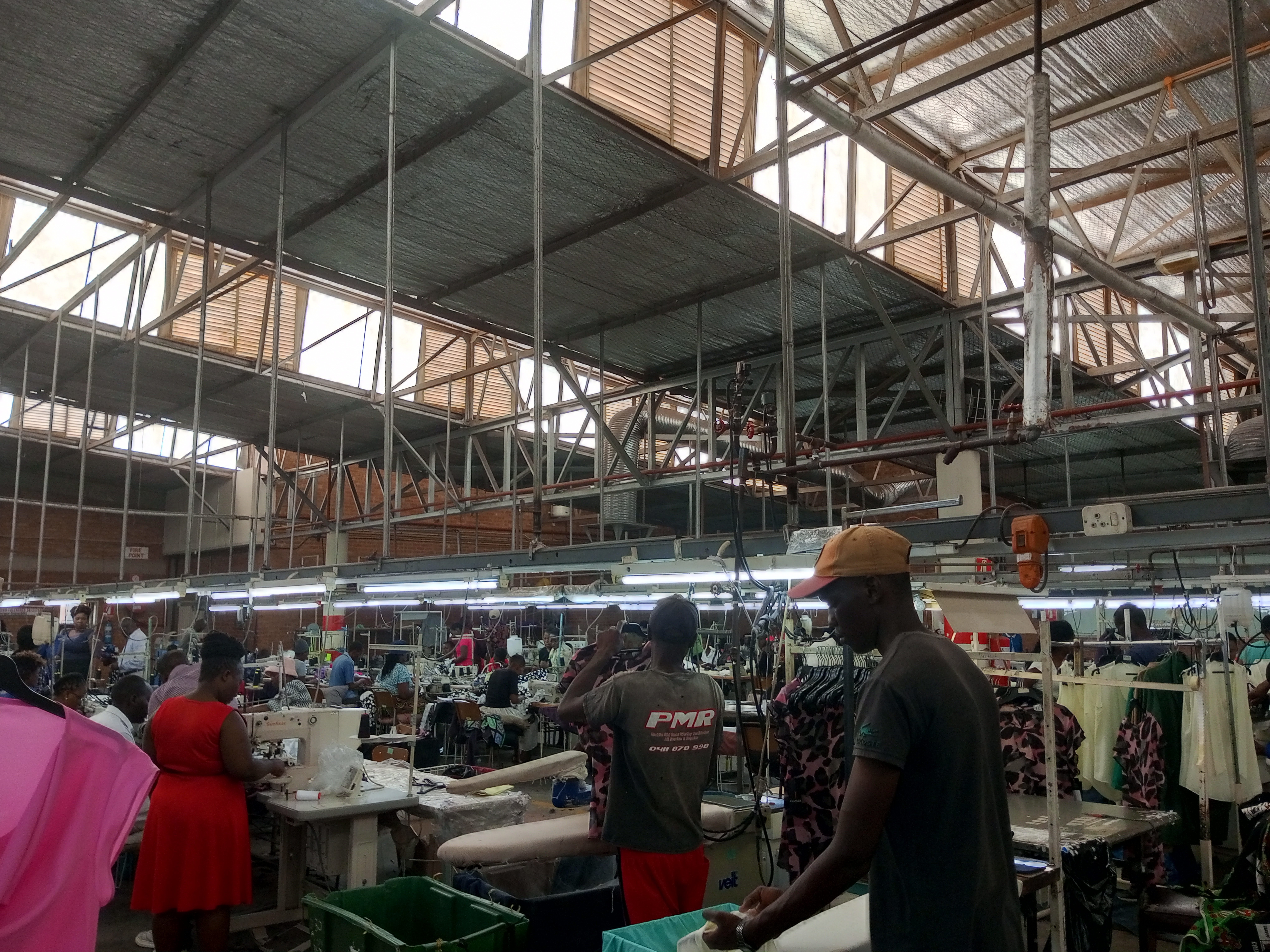TAKUDZWA HILLARY CHIWANZA & KINGSTONE ZIMUNYA
BULAWAYO – There was a time in Zimbabwe when Edgars Stores Limited was an unrivalled and formidable retail clothing, footwear, textiles and accessories giant. A trip down memory lane evokes nostalgic images of the iconic red square logo; synonymous with quality.
 |
| Edgars Stores Limited strives for a world class retail experience. [Image: File Photo] |
And this drive has not vanished as a remarkable story of resurgence is happening at Edgars Stores Limited, which has been on a path to reclaim its glory days. The group’s vision statement aptly sums it: “We aim to be Zimbabwe’s undisputed market leader in the clothing and footwear retail business offering quality, value and superior customer service in world class shopping environments.”
Navigating turbulent times: the challenges faced and endured
But as with any other formal enterprise operating in a harsh economic environment averse to business-friendly policies, Edgars has not been spared from plunging fortunes and trading woes. Inconsistent policies, unstable exchange rates, soaring inflation, and the ever-shrinking incomes all conspired to give Edgars Zimbabwe an existential scare.
In addition to the effects of a challenging Zimbabwean economy, Edgars' fortunes took a nosedive during the COVID-19 pandemic where lockdowns and travel restrictions meant the clothing retail company's ability to trade was curtailed.
The perceptions of prestige and impeccable quality that have been a mainstay of the Edgars brand became a relic of the past, and epitaphs on the seemingly demise of Edgars were authored.
For many, Edgars was a brand belonging to the past; declared dead and buried especially in a country where the local textile industry is perennially on its knees - with cheap clothing second hand imports having flooded the market.
A new dawn: The strategic leadership and business moves by SSCG
Yet, in spite of these enormous challenges, Edgars never died. And this is attributable to ownership changes; whose objective is to help Edgars reclaim its position as a source of quality and exclusive apparel, plus world-class shopping experiences it is renowned for.
In September 2019, Edcon sold its 41% stake in Edgars Zimbabwe Stores Limited to Sub-Saharan Capital Group (SSCG).
SSCG is an investment group/private fund domiciled in Mauritius, which also has interests in Gain Cash & Carry. It recently took over the struggling wholesaler Metro Peech & Browne.
Nine months later, long serving CEO Linda Masterson stepped down to make way for Tjedudo Ndlovu, who had risen from Group Financial Account to Jet Stores Managing director in just eight years.
For Ndlovu—who was at the helm in extremely challenging times—the Edgars path towards viable and sustainable growth was thorny and seemed a Herculean task. Progress was slowed down by the COVID-19 pandemic during which the retailer lost seven trading weeks due to lockdowns.
By the time lockdown restrictions eased, most of the merchandise the retailer had in stock was out of season, and it was clear that clothing retail landscape in Zimbabwe had shifted, with WhatsApp groups and ‘runners’ in the city centre malls taking centre stage.
Stakeholders clamoured for a change in overall strategy to ‘fight the competition.’ Edgars, with its eight decades of experience, refused to be easily elbowed into non-existence. It simply needed to rediscover and reassess the secret to its longevity and align those values with the present. And this is what SSCG did.
The strategic move: Headquarters relocation and perceptions of rash decisions
In 2023, it was announced that Edgars had shifted its headquarters from Bulawayo to Harare, the capital city. It was a move not openly embraced by all stakeholders, and it elicited a multiplicity of reactions, with some supporting the move while others alleged unfair treatment and an abandonment of the company’s roots and commercial heritage – Bulawayo.
Yet, the headquarters move to Bulawayo was not spurred by mere reactionary or sentimental intent – it was simply a strategic business move to position Edgars as the leading clothing retailer in Zimbabwe.
The relocation aimed to enhance operational efficiency, streamline decision-making, and create a platform for expansion by leveraging Harare’s position as the commercial capital of the country.
The most conspicuous reaction that surfaced following the management changes and shift of the headquarters to Bulawayo was that Edgars had capitulated to the desires of shareholders and had thus abandoned its roots in Bulawayo, with reports that the move had sparked some opposition from other sections of employees.
There was a perception that Edgars’ move to Harare implied a new identity for the company; and that identifying with Bulawayo was now consigned to the past.
In light of this, what many glossed over was the fact that Edgars, with newly-appointed chief executive officer (CEO) Sevious Mushosho at the helm, has simply embarked on a new path: to move with the times, adapt in a volatile and unpredictable business environment and keep doing business in it – a trajectory in which Edgars Stores Limited earnestly and assiduously strives to surpass its successes of the 1990s.
The new management is intent on leading the Edgars group towards being a world-class clothing retailer unwaveringly serving their target markets with the best quality and breathtaking shopping experiences that rival or even surpass those in Singapore, Dubai, or London.
Carousel – The heartbeat of Edgars’ resurgence
And central to this new strategy is the plan for Edgars to control its own supply and distribution chains. Carousel, located in Bulawayo, Zimbabwe, is the manufacturing arm of Edgars Group, and has a key role to play in the plan.
 |
| The entrance to Carousel manufacturing unit. |
The Bulawayo-based factory will be the lifeblood of the company, producing high-quality garments which will augment product from Edgars' other supply chain partners.
Carousel’s history dates back to 1974—and it was acquired to provide a bulwark against potential risks related with erratic supplies and stockouts which could easily scupper service delivery. In 1993, the Edgars Group also acquired the Jeans Company, a denimwear manufacturer.
Given the challenges that Edgars has faced in the past recent years due to a myriad socio-economic difficulties, production levels at Carousel had sharply dipped, impacting the overall performance and sustainability of Edgars.
A vision for excellence: Carousel’s guiding light
A visit to the Carousel factory in Bulawayo last week told a different story. The place teems with innovation, artistic and technical ingenuity, industriousness, and a palpable collective belief that the company is on a resolute steady path back to its exceptional standards. From the Management, to the Designers, to the tailors and machinists, the synergy in making Edgars Stores Limited the best in clothing is palpable at the factory.
Speaking with ZimSphere, Menfree Tanyanyiwa, the Managing Director of Carousel (Private) Limited, brimmed with confidence and enthusiasm regarding the path that both the manufacturing and retail units are taking, expressing joy and satisfaction in Carousel’s improved production levels and Edgars’ resolve to be a leading industry player again.
Tanyanyiwa said moving Edgars’ headquarters to Harare was not abandoning the roots - if anything, the fact that Carousel is on a growth path affirms the Group's desire not to abandon its roots: Bulawayo.
“We have a massive operation here, an operation with loads of potential to get back to its glory years. The bulk of our potential sits with the fact that we are the biggest formal [clothing] retailer in Zimbabwe. In keeping with that position, one needs to secure the product needs. This is why over 70 years ago the managers at the time thought of having backwards integration to make sure that we have a manufacturing unit of our own capable of doing a diverse range,” said Tanyanyiwa.
“Our range is wide because we’re trying to cater for the diverse needs of our customers. We wish to localize our production by owning and controlling the supply chain. If you have good control over the value chain you probably have a better control of your retail market. The infrastructure we have here [at Carousel] is testament that we're here to stay.
"We’re aiming to be over fifty percent of 1999 production levels by end of the second quarter of 2024 and to be at 90% of that level by year end. That is the time when the clothing industry was employing around 35,000 or 36,000 people in the supply chain In terms of our Carousel capacity, we aim to get back to those production levels achieved during the years when clothing manufacturing and retail were booming.”
Rooted in Bulawayo: A commitment to heritage
This is how grand the plan is and Carousel is indispensable to the achievement of this business ambition. Tanyanyiwa added that Carousel is currently producing more that it ever did in the last six years, and highlighted that the manufacturing unit was in Bulawayo to stay and make a positive contribution to all the stakeholders in the city and beyond.
Tanyanyiwa said that employment numbers have surged.
“I’m hoping that by the end of this month, Carousel should have 400 employees,” he said, which will be an increase from the current 350+ employees.
Carousel is focused on utilizing both human labour and machines, highlighting the need for more technologically advanced machinery like laser-cutting machines, in addition to the denim laser machine.
Tanyanyiwa reiterated that the shift to Harare did not signify any departure of Edgars from its ‘Bulawayo roots’, stressing however that business decisions have to be made.
“Business, as with culture, is dynamic. If you get stuck and become sentimental about locations instead of continuing to support the business, you will get left behind. What’s important is to stay faithful to what the business model requires and see how best you can continue to serve the market regardless of where the CEO’s office is.
“The business has to grow in spite of where the CEO’s physical office is. The biggest employer within the Edgars group by numbers is Carousel. We make up over 30% of the total workforce, the heart and soul of Edgars therefore still remains within Bulawayo.
Quizzed about whether the business placed too much reliance on international trends, Tanyanyiwa said, “In fashion, you don’t always have to rely on international trends alone. A business exists within a certain culture. Its important to remain grounded within your own culture and your own value systems, because ultimately our customers don’t come from Europe or Asia, they come from our community.”
Despite being involved in various Corporate Social Responsibility projects, Tanyanyiwa believes the best way Carousel can uplift the Bulawayo community is through employment creation.
“What’s important is to continue to give jobs to the community. When you give one breadwinner a job, you’ve secured the lives of at least five people that depend on him/her. The biggest duty we have is to ensure that we continue to run this operation as a viable manner so that so many people can continue to derive benefit from it.”
A world class vision vis-à-vis an uncertain, volatile macroeconomic environment
Edgars’ ultimate goal is to become a world-class clothing retailer, offering unparalleled quality and shopping experiences. The company is investing in infrastructure, technology, and human capital to achieve this ambitious vision. With a renewed focus on customer satisfaction and innovation, Edgars is poised to reclaim its place at the forefront of Zimbabwe’s retail industry.
However, given the extremely volatile nature of Zimbabwe’s macroeconomic climate, it of course remains to be seen whether Edgars’ plans will translate to the reality it desires. What is clear though is that the retail giant is on a mission to reclaim its position as a formidable clothing retail giant.
With Carousel in Bulawayo serving as the bedrock of its manufacturing Edgars is in a much favourable position as compared to the recent past years to surpass its past glories and establish itself as a global leader in clothing retail..








.jpeg)




.webp)







0 Comments